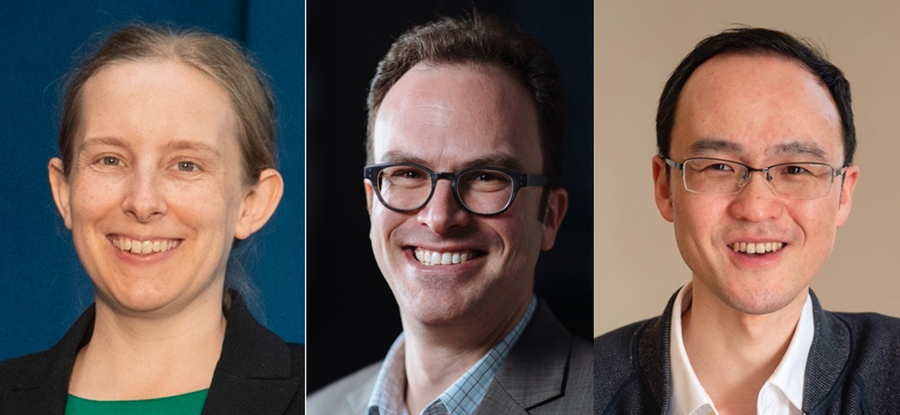
Three MIT faculty members named 2022 Simons Investigators
(Left to right:) Physics professors Tracy Slatyer and Jesse Thaler, and mathematics professor Wei Zhang
Original Article: MIT News
Physics professors Tracy Slatyer and Jesse Thaler and mathematics professor Wei Zhang were among 16 researchers selected to receive 2022 Simons Investigator awards in mathematics, physics, astrophysics, and computer science.
This program supports “outstanding theoretical scientists in their most productive years, when they are establishing creative new research directions, providing leadership to the field, and effectively mentoring junior scientists.”
Appointed for an initial period of five years, each investigator receives research support of $100,000 per year, with an additional $10,000 per year provided to the investigator’s department and an additional 20 percent in indirect costs awarded to the investigator’s institution.
Tracy Slatyer is a theoretical physicist who works on particle physics, cosmology, and astrophysics in the Center for Theoretical Physics. Her research includes studying the nature and interactions of dark matter in astrophysical and cosmological data, including the possible effects of dark matter interactions from the early universe to the present day. She was a co-discoverer of the giant gamma-ray structures known as the “Fermi bubbles” erupting from the center of the Milky Way.
A graduate of the Australian National University in 2005, she completed her doctoral work in physics at Harvard University in 2010 and was a postdoc at the Institute for Advanced Study until 2013, when she joined the MIT Department of Physics.
Jesse Thaler is a theoretical particle physicist in the Center for Theoretical Physics, where he fuses techniques from quantum field theory and machine learning to address questions in fundamental physics. His current research focuses on maximizing the discovery potential of the Large Hadron Collider through new theoretical frameworks and novel data analysis techniques. Thaler is an expert in jets, which are collimated sprays of particles copiously produced at colliders, and he studies the substructure of jets to enhance the search for new phenomena and illuminate the dynamics of gauge theories.
Thaler received his PhD in physics from Harvard in 2006 and his ScB in math/physics from Brown University in 2002. From 2006 to 2009, he was a fellow at the Miller Institute for Basic Research in Science at the University of California at Berkeley, and he joined the Department of Physics in 2010. In 2020, Thaler became the inaugural director of the NSF AI Institute for Artificial Intelligence and Fundamental Interactions.
Wei Zhang is a number theorist working on automorphic representations and arithmetic geometry. He studies special values of zeta and L-functions and their relation to periods and heights of algebraic cycles on moduli spaces over global fields. A focus of his research is various high-dimensional generalizations of the Gross-Zagier formula. In particular, Zhang proposed the relative trace formula approach, which has led to many new deep questions relating the harmonic analysis on spaces with a group action over local fields to the arithmetic intersection theory on local Shimura varieties.
He received a BS from Peking University in 2004 and a PhD from Columbia University in 2009, both degrees in mathematics. Following a postdoc at Harvard, he was (separately) appointed Benjamin Peirce Fellow at Harvard from 2010-11. He subsequently joined the mathematics faculty at Columbia University in 2011, and in 2017 the MIT mathematics faculty as full professor.
Zhang received the 2010 SASTRA Ramanujan Prize, the Sloan Research Fellowship in 2013, Morningside Gold Medal of Mathematics at ICCM 2016, the 2018 New Horizon prize in mathematics, and 2019 Clay Research Award. In 2018, he gave an invited address at ICM 18 in Rio de Janeiro. He was named a fellow of the AMS in 2019.
Reprinted with permission of MIT News.



